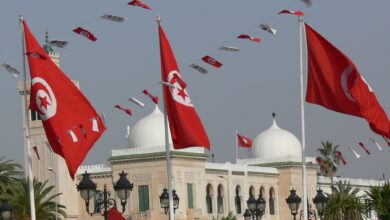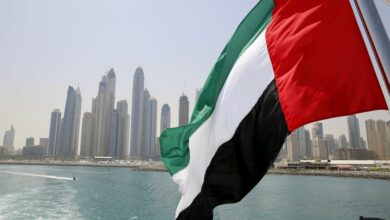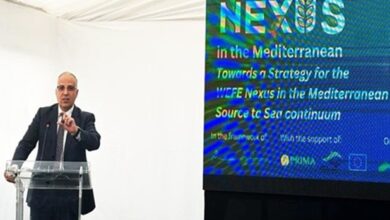“So perfect a police state was his Tunisia, with its ubiquitous informers and portraits of the president, that no one predicted Ben Ali's ship could capsize.”
The lead for Mona al-Tahawy’s analysis in the Washington Post entitled Tunisia’s Jasmin Revolution could so easily be applied to any other Arab country.
The superficial similarities between the methods applied by both the Egyptian and the former Tunisian regimes in maintaining a tight grip made much of the Egypt’s society high on just the mere whiff of change in another Arab country.
“O’balna”– cautiously rendered in English as “hopefully we are next”–was definitely the word of the day on the Egyptian streets.
“We’re going through the same kind of oppression and poverty here. People are sick of it. What’s happening in Tunisia is very encouraging. O’balna!,” said Amr Seleem, a 35-year-old scrap metal dealer in Old Cairo.
Almost all Egyptian outlets covered the story as front-page news.
Sitting next to Seleem, Ahmed Abdellatif, a 40-year-old grounds keeper discussed the situation. “I don’t get how the Saudis accepted Bin Ali in the country. They say he is not religious and is against Islamic groups. At least the Tunisians got rid of him.”
Reactions to the story were tempered with some realism.
“There’s no way their police force is more brutal than ours. Egyptians are too scared of the police to do anything like this. America is also too reliant on Mubarak’s government to let anything like this happen,” said Sameh Diab, a 38-year-old who owns a small car rental agency in Cairo’s Manyal neighborhood.
Online forums, which have become a prominent mouthpiece of young, educated Egyptians, were buzzing with hopeful remarks and messages of congratulations filling online social networks such as Facebook.
One message, by a 29-year-old Egyptian marketing agent read, “Congratulations on the fall of one dictator! Hopefully this will lead to many others. Egyptians, let’s learn from our Arab brethren!”
“This is the beginning of resolution for an issue that we all suffer from,” reads another wall posting by 25 year-old blogger and financial analyst, Ahmed Aziz.
Known psychiatrist and political pundit Shawqy Al Aqabaoui said that there is a wide-gap between what he sees as “wishful thinking” on the part of the Egypt’s “sliver of intellectuals,” and the reality on the ground.
“There is a profound difference between the Tunisian community and the Egyptian one. We have a much poorer population who has been indoctrinated and incapacitated into a state of apathy and weakness,” he said. “The psyche of the poor Egyptian has been beaten by the current regime into submission.” He added that Egyptians are preoccupied with day-to-day sustenance, which has been purposefully kept by the government right above the point of absolute despair.”
The realities of Tunisia do in fact differ greatly from Egypt’s.
Tunisia is a country of around 10 million people, and its community is more educated than Egypt’s. The difference in scale—Egypt’s 80 million inhabitants–is not lost on intellectuals such as Aqabaoui. “The scale of an Egyptian movement, and the severity of its consequences has to be at least 8 times greater than what Tunisia has seen,” he said.
Aqabaoui also believes that the lack of an intellectual vanguard in Egypt will keep people from acting.
“Tunisians intellectuals are mostly secularists who believe in revolting against unjust rulers. Here you have those who are complicit with the regime, and on the other hand Islamists who believe in submission to the ruler, as long as he doesn’t get in the way of performing their daily prayers.”
Adel Thabet, an unemployed 25-year-old punctuated this point by saying, “it’s good that the Tunisians got rid of him, he’s a secularist.” Tunisia is known for having a staunchly secularist legal system. “I don’t think Egyptians should do the same.”
Presently, Egyptians seem content to live vicariously through Tunisia’s experience, and seem to have found an unlikely shiny mirror on which to reflect their own hopes.
“People are happy, and want to dream. Let them dream there’s nothing wrong with that. I’ve lived long enough in this country to know that it is very unlikely that what happened there can happen here,” Awad, a 63-year-old café owner said.
For many on the street, the sense of O’balna, is mixed with an ambivalent mélange of conflicting emotions that tempers hopefulness in the face of Egypt’s unique realities.
“Maybe we are a little more scared, as a population to do anything,” Seleem said, “but as the saying goes, the first drizzle usually foreshadows a rain shower. O’balna my brother!”




